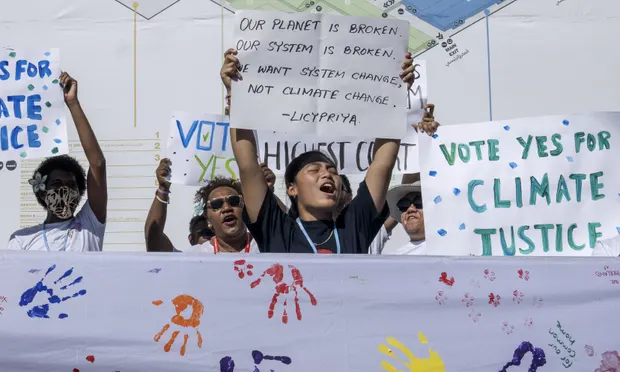A group of Pacific Island students who played a major role in pushing a United Nations resolution that should make it easier to hold polluting countries legally accountable for failure to act on the climate crisis have greeted its adoption as historic.
Solomon Yeo, campaign director of Pacific Islands Students Fighting Climate Change (PISFCC), who is from the Solomon Islands said, “Young people across the world will recall the day when we were able to get the world’s highest court, the international court of justice, to bring its voice to the climate justice fight,”.
Among other things, the resolution calls for the international court of justice (ICJ) to issue an opinion clarifying nations’ obligations to tackle the climate crisis and the consequences they should face for inaction.
“I don’t want to show a picture to my child one day of my island. I want my child to be able to experience the same environment and the same culture that I grew up in,” said Cynthia Houniuhi, also of Solomon Islands and who is president of PISFCC. “The environment that sustains us is disintegrating before our eyes.”
Law students in eight Pacific island nations founded PISFCC in 2019 and launched their campaign to persuade their leaders to take the resolution to the UN’s highest court, having been frustrated by the world’s lack of action on climate change.
Read also: UK is Europe’s worst private jet polluter, study finds
Spearheaded by Vanuatu, Pacific nations soon took up the law students’ call.
According to reports, Pacific Island nations are at risk of rising seas engulfing swathes of the islands and scientists say that both extreme weather and sea levels have worsened because of climate change caused by the burning of fossil fuels. The resolution asks the court to pay particular attention to the harm endured by small island states.
In his reaction, Vanuatu prime minister Ishmael Kalsakau greeted the resolution as “a win for climate justice of epic proportions.”
“Today’s historic resolution is the beginning of a new era in multilateral climate cooperation, one that is more fully focused on upholding the rule of international law and an era that places human rights and intergenerational equity at the forefront of climate decision-making,” he said.
UN secretary general António Guterres said that he hoped that when issued, the opinion would encourage nations “to take the bolder and stronger climate action that our world so desperately needs”.
Story was adapted from the Guardian.
